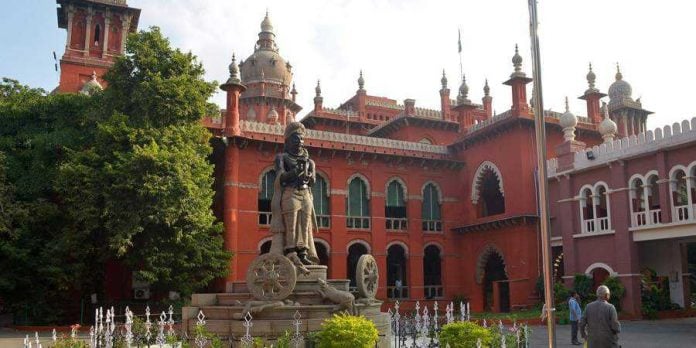The Madras High Court in an urgent hearing on Sunday disapproved the prohibitory order passed by the Puducherry Administration/ Collector exercising her powers under section 144 of the Code of Criminal Procedure.
The division bench of Chief Justice Sanjib Banerjee and Justice Senthilkumar Ramamoorthy passed this order while hearing a petition filed by R. Rajangam.
A Puducherry official of a national party had filed the PIL against the order passed under Section 144 of the Code of Criminal Procedure, 1973 by the District Magistrate in Puducherry.
The order dated March 22, 2021 was, according to the petitioner, made public only on April 1, 2021 and is to come into effect from 7 pm on April 4.
The petitioner pointed out that there is nothing in the relevant order which suggests any unrest or anything untoward or even the apprehension of anything unlawful for a clampdown to be imposed.
The petitioner said that since this is a free country, the citizens can go about their usual chores as they choose and the election day, when they exercise their most basic democratic right, is no time to curb their right to move about freely or do other things as they choose.
The petitioner stated that it is inconceivable that throughout the entire Union Territory of Puducherry, small as it is, there is a situation that requires an order of the nature under Section 144 of the code to be imposed.
The petitioner submitted that while assembly elections are being conducted in several other states, except in certain sensitive areas in some of the other states and not even covering the entirety of the constituency in each case has Section 144 of the code been imposed.
Also Read: Bombay High Court orders CBI probe into Mumbai Police ex-chief’s plea (Read Order)
The petitioner further submitted that the sine qua non for passing such an order, restraining the usual freedom of movement, is upon the apprehension of any mischief or anything untoward or an emergency; and, without the satisfaction of the magistrate being expressed in such regard, the power to invoke the jurisdiction does not arise.
The petitioner further informed the court that the result of this order would be that only the committed voter who will step out to vote as the ordinary voter may be led to believe that there is a possibility of trouble or violence and it may be better to not step out, even to vote.
The Election Commission said that section 144 of the code has been imposed throughout Puducherry in every general election since 2014.
The bench asked the Election Commission to issue a clarification that “prohibit the unlawful assembly & movement” wouldn’t stand in the way of citizens going about their normal business and chores.
“Thankfully, this country allows expansive freedom to its citizens and, as the Constitution provides, there cannot be any authoritarian regime possible in the country nor any regimentation of the citizens or their lives,” the court said.
However, the court further stated that sometimes, for the purpose of maintaining law and order and in the public interest, certain restrictions may be imposed, but such restrictions have always to be reasonable, proportional to the anticipated problem and the decision in such regard is always justiciable.
“Every citizen in a free country can do anything lawful that the citizen chooses and even the slightest of restriction on the citizens’ movement has to be justified. In the case, the notice of March 22, 2021 is singularly lacking in indicating any cogent reason for imposing restrictions on citizens’ movement and how citizens may choose to go about their business,”
-the court observed.
The court stated that a blanket prohibitory order is passed merely because it was done on one or two previous occasions and despite the order not indicating any basis for any apprehension of trouble or unlawful activities. The issuance of a supercilious prohibitory order 2021 on the ruse that it would lead to smooth conduct of the election cannot pass muster without there being any justifiable basis therefore.
However, to the extent that the Election Commission has clarified that the prohibition should not be regarded as a blanket prohibition of movement or assembly but confined to the specific areas, the court observed that
“It needs to be reiterated that the relevant order will be strictly restricted only to the prohibition of ‘unlawful assembly & movement, holding of public meetings, carrying of weapons, sticks, banners, placards etc., by any person and shouting of slogans and using of Loud Speakers and acting in any manner detrimental to public peace and tranquility’ In a sense, it is unnecessary to issue an order prohibiting unlawful assembly, since such an assembly, by definition, is illegal.”
“There is sufficient basis to the petitioner’s suggestion that the order may otherwise not be justified, particularly since it is difficult to imagine how and in what circumstances the order has been made some 10 or 15 days before the order comes into effect. Officials must be reminded that curbs are imposed on citizens and their freedom of movement and the like only when there is an imminent need therefor or it is in the larger public interest. Due care and caution must be exercised to ensure that the restrictions are not unreasonable or suffocating. The present kind of unreasoned order prepared 10 or 15 days in advance and produced a day or two before it becomes effective goes against the ethos of Section 144 of the code, though it must be acknowledged that the Union Territory says that the notice was published on the Union Territory’s website on March 23, 2021,” the order reads.


